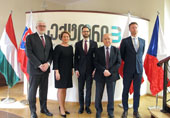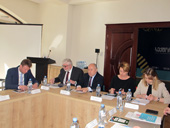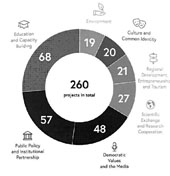
V4 Funds for NGOs presented in Tbilisi, Georgia
By Nika Gamtsemlidze
Monday, April 1
The conference called “V4 Funds for NGOs” was held in Tbilisi last Friday, March 29 and it was attended by ambassadors of V4 countries. H.E Ms. Viktória Horváth (Hungary), H.E Mariusz Maskiewicz (Poland), H.E Mr. Pavel Vizdal (Slovakia) and Mr. Jirí Preclík (Charge d’Affaires, Czech Republic.)
The event was opened by a welcoming speech of the representative of State Ministry of Georgia for Reconciliation and Civic Equality. She emphasized that we are facing the same problems as the V4 countries faced before and that we can benefit from their experience. During her speech, she thanked the ambassadors for the continued support and assistance of Georgia.
In the first half of the event, the V4 ambassadors had an engaging discussion about the Visegrad Fund. They talked about the importance of the fund, as well as the progress that they have achieved throughout the years.
As the ambassadors stated the most important part of V4 is the communications and friendships it offers to the world. They also noted that their aim was to make their work visible and understandable for everyone.
Viktória Horváth, the ambassador of Hungary said: “I am sure that from now on you will have so many applicants from Georgia, and there will be so many great ideas, that you won’t be able to choose the best”.
The Visegrad Fund was established in the year of 2000 by the governments of the four Visegrad Group countries – Czech Republic, Hungary, Poland, and Slovakia. The main purpose behind this was to promote regional cooperation in not only V4 region but also in other countries, especially in the Western Balkans and Eastern Partnership regions.
The Fund has an annual budget of 8 million Euros, which is provided by the equal contributions of all the Visegrad region nations. Since 2012, other donor countries have also provided a total of 10 million Euros in donations (the United States, The Netherlands, Sweden, Canada, Germany, South Korea, and Switzerland).
Visegrad 4 Eastern Partnership Program (V4EaP) was established in 2011 by the governments of the V4 countries to promote cooperation, to deepen and strengthen relationships between the Visegrad region and the countries of the Eastern Partnership - Armenia, Azerbaijan, Belarus, Georgia, Moldova, and Ukraine.
The program was launched in early 2012 with a budget of €1,456,800, which included four different grant and mobility programs. In addition, a grant from the Netherlands in the amount of €1.5 million was awarded to the program in June 2012. V4EaP currently represents the Fund’s biggest grant program.
The Projects supported through the V4EaP program in Georgia are meant to strengthen reform processes, political association and economic integration with the EU, contributing to the development of civil society and the overall transformation of all Eastern Partnership (EaP) countries. As the second biggest recipient, Georgia has received massive amounts of grants for very successful projects, such as Ciné-DOC Tbilisi, the main international documentary film festival of the Caucasus region.
The V4EaP project has contributed to developing cooperation, exchange of knowledge, education and research institutions in Eastern Partnership countries.
Visegrad+ Grants support NGOs, civil society organizations and the public and private sectors that aim to share knowledge and engage communities in Eastern and Southeast Europe. (see the diagram)
“We are not expecting to change the world, the thing that matters for us is friendships and connections we can build” noted the executive director of the International Visegrad Fund, Mr. Andor F. Dávid. As he said, four dots on the Visegrad Group logo represents four capitals of V4 countries – Prague, Budapest, Warsaw, and Bratislava. He also talked about how important Georgia is for V4, and how similar our past and aspects of history are.
Anna Adamczyk, project manager of the International Visegrad Fund, talked about the steps that one needs to take if they are interested in getting help from the fund.
“If you have an idea that you need support for, all you have to do is to come up with a project and find a partner from at least 3 Visegrad countries.” The next step is to create an account on My Visegrad and submit your project there. You should also consider the deadlines, which are on February 1, June 1 and October 1 at noon.
The event was hosted by Keti Chachua, who was very excited to welcome people on the pre-opening event of the project. She noted that she had an idea to make an online hub where “people can discuss different ideas. Where they will be able to find partners or sponsors for their projects”.
The Visegrad Fund encourages everyone to see their programs and benefit from them for the future development of Georgia. The conference made submitting projects more efficient for those who attended it, the audience also had a chance to meet the representatives of the fund, who shared their experiences and knowledge with them.



